Tylenol Lawsuits and the FDA: Regulatory Insights and Implications
- Last Updated: February 16th, 2026
Key Takeaways
Tylenol lawsuits shed light on the FDA's regulatory role in monitoring and ensuring the safety of over-the-counter medications.
These legal cases have far-reaching consequences for pharmaceutical companies, emphasizing the importance of adhering to FDA guidelines.
Tylenol lawsuits serve as a reminder for consumers to be informed about the products they use and to report adverse effects promptly, contributing to safer medications.
Tylenol Lawsuits and the FDA: Regulatory Insights and Implications
On this page, we’ll discuss the FDA’s take on Tylenol Lawsuits, Tylenol recalls and FDA actions, who qualifies to file a Tylenol Lawsuit, and much more.
Intro to the Tylenol Lawsuits
In the complex world of pharmaceuticals and fetal medicine, the Food and Drug Administration (FDA), a government agency, plays a pivotal role in drug regulation under federal law, with oversight from federal courts.
A prime illustration of product liability claims is seen through the lens of Tylenol lawsuits in federal cases, where expert testimony and plaintiff fact sheets become crucial pieces of evidence in multidistrict litigation.
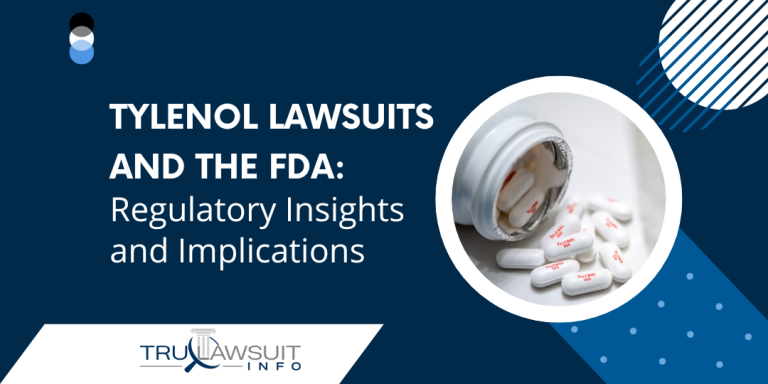
The relationship between FDA regulations and such federal cases, particularly product liability lawsuits, is intrinsic.
Attorneys often find each case offering valuable insights for future litigation scenarios in federal court.
On this page, we’ll provide an overview of the regulatory insights and implications drawn from mass tort lawsuits, underscoring the significance of Tylenol autism lawyers, product liability, and plaintiffs in shaping future drug litigation strategies.
Understanding these dynamics can provide a revealing perspective on how our federal law and regulatory systems intersect in the realm of pharmaceuticals.
FDA Regulations and Tylenol: Understanding the Oversight
The Food and Drug Administration (FDA) has a set of regulations specific to over-the-counter medications like Tylenol, which is one of many acetaminophen products.
These rules also apply to generic acetaminophen.
The FDA oversees acetaminophen use and handles any related Tylenol lawsuits.
These product liability rules, their enforcement under federal law, and the implications of non-compliance are critical factors in understanding how regulatory oversight impacts drug manufacturing.
This study explores how these elements interact.
Specific FDA Regulations for Tylenol
Tylenol, an acetaminophen-based medication known to cause pain relief, falls under the purview of the FDA’s federal law regulations for over-the-counter drugs.
A Tylenol lawyer handles product liability issues in such cases.
The regulations warn retailers that manufacturers should adhere to certain safety standards during production to mitigate risk under various conditions.
For instance, in terms of product liability, they must ensure proper labeling and warning that clearly indicates dosage instructions and potential side effects of generic acetaminophen to prevent acetaminophen exposure.
Enforcement by the FDA
To ensure compliance with product liability regulations, the FDA conducts periodic inspections of manufacturing facilities.
Retailers are also scrutinized in these studies before filing any reports.
Retailers often assess whether manufacturers are adhering to Good Manufacturing Practices (GMPs), which include maintaining clean facilities and testing products for quality.
Studies show this reduces the risk of non-compliance, providing evidence of commitment to safety standards.
If a manufacturer fails a product liability inspection, retailers may be subject to further risk and scrutiny, including potential warnings or penalties.
Consequences of Non-Compliance
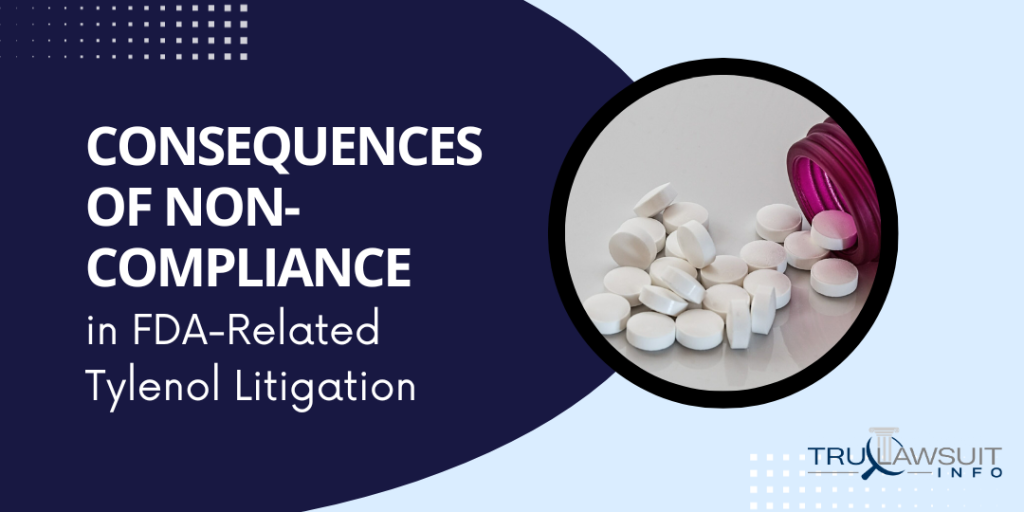
Non-compliance with FDA regulations can lead to severe product liability consequences for drug manufacturers and retailers.
This can result in litigation, especially if a proper warning is not given.
These can range from Tylenol litigation fines and liability lawsuits to product recalls with associated warning risks or even shutdowns in extreme cases.
In 2010, McNeil Consumer Healthcare faced litigation due to acetaminophen exposure risks, prompting them to recall certain lots of children’s Tylenol, a popular acetaminophen use.
This led to a class action lawsuit over quality issues.
Regulatory Oversight Impact on Drug Manufacturing
Regulatory oversight significantly impacts acetaminophen use, like Tylenol, its manufacturing, and associated litigation risk.
This also influences the necessity for warning labels.
Manufacturers must invest heavily in quality assurance processes and equipment to avoid exposure to litigation, meet stringent FDA requirements, and mitigate warnings of potential MDL.
This not only ensures patient safety but also protects companies from costly penalties and litigation associated with non-compliance.
It also serves as a warning, reducing exposure to potential cases.
The FDA's Role in Drug Safety: Tylenol as a Case Study
FDA’s Responsibility in Ensuring Drug Safety
The Food and Drug Administration (FDA), akin to a court for public health in the United States, is the guardian against potential Walmart-like health infringements.
Tylenol ADHD lawyers often issue warnings under its authority.
Their primary responsibility is to ensure that drugs like acetaminophen, often found in children’s Tylenol, are safe for use and carry sufficient court-approved warnings.
They accomplish this through rigorous scientific studies and risk assessments, examining exposure cases, and issuing relevant warnings.
Here are some of the examples:
- They scrutinize clinical trials conducted by drug manufacturers.
- They assess the effectiveness of acetaminophen use against its potential risks in a study, considering exposure and any necessary warning.
- Post-market surveillance is conducted to monitor any adverse effects, like exposure and warning signs related to acetaminophen use during pregnancy.
The Case of Tylenol: An Analysis
In the case of Tylenol, a popular over-the-counter medication containing acetaminophen, the FDA played a crucial role in court cases and issuing warnings.
When concerns arose about its potential impact on fetal brain development during pregnancy, they didn’t sit idle.
The exposure had potential effects on children, and in several Tylenol autism cases, these fears were justified.
They reviewed multiple studies linking prenatal acetaminophen (Tylenol) use during pregnancy to ADHD and autism, both hyperactivity disorders in children.
A class action lawsuit was initiated by the plaintiffs, adding fuel to the fire in court cases related to exposure.
This led to extensive research on acetaminophen exposure during pregnancy and, ultimately, stricter regulations on dosage recommendations in such cases.
Impact on Public Health Due to Lapses
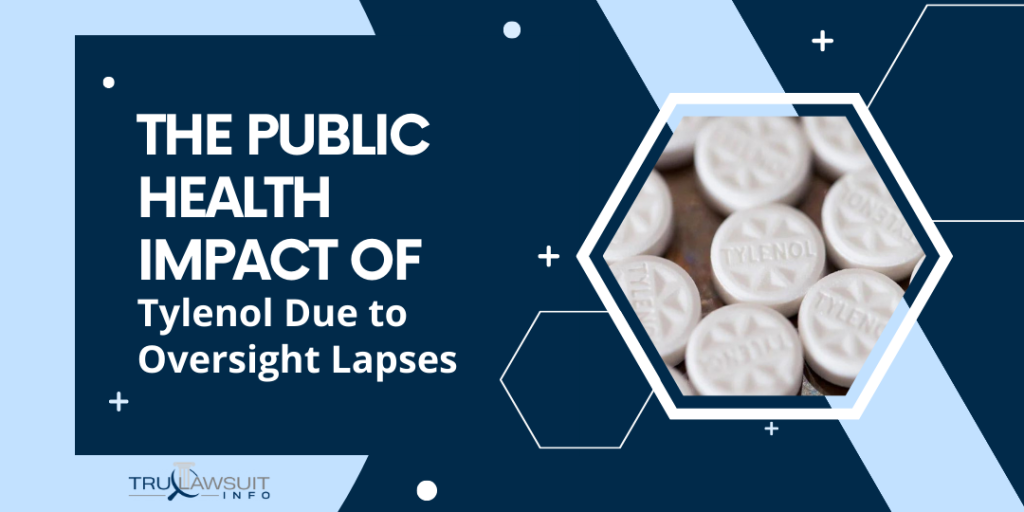
However, lapses do occur.
In some cases, exposure during pregnancy can have significant implications for children’s health, leading to court proceedings.
For instance, in ADHD cases, if an effective dose of acetaminophen is not correctly established or communicated, it could lead to misuse and possible harm in the MDL.
Here are some instances:
- Overdose of Tylenol has been linked with liver damage.
- Pregnant women who excessively used acetaminophen faced an increased risk of their children developing ASD (Autism Spectrum Disorder) or ADHD.
Lessons Learned from the Case Study
The acetaminophen-related Tylenol lawsuit serves as an important lesson for both regulatory authorities and consumers alike, particularly in cases involving plaintiffs.
The text underscores how vital continuous monitoring of ADHD cases and timely intervention during pregnancy are, particularly for children.
Here are some lessons learned from case studies:
- For regulators like the FDA dealing with cases of ADHD and pregnancy, it underscores the need for robust post-market surveillance systems, such as MDL.
- For consumers, particularly parents of children: It emphasizes that even over-the-counter medications like acetaminophen (Tylenol) should be taken responsibly, following recommended dosages.
- This is especially important given the reported cases linking Tylenol to autism in children.
Tylenol Recalls and FDA Actions: A Regulatory Timeline
Major Tylenol Product Recalls
The medical history of Tylenol, known as acetaminophen, is marked by several recalls and lawsuits.
Some plaintiffs have raised concerns about its use during pregnancy.
One of the most notable Tylenol lawsuits occurred in 1982 when seven people died after consuming Extra-Strength Tylenol, an acetaminophen product, capsules laced with cyanide.
This case was part of an MDL related to pregnancy risks.
Johnson & Johnson, the manufacturer of Tylenol, an acetaminophen product, promptly pulled approximately 31 million bottles off the shelves amidst a lawsuit, costing them over $100 million.
This action was taken as part of an MDL, with numerous plaintiffs involved.
In 2010, another significant recall took place due to reports of a musty odor emanating from certain products, leading to an MDL lawsuit by plaintiffs alleging pregnancy-related issues.
The culprit, traced back in the MDL lawsuit by plaintiffs, was a chemical used on wooden pallets during transport.
This led to an MDL lawsuit recall of around 60 million bottles, triggered by a pregnancy case.
FDA’s Involvement During Recalls
During each major recall event related to the pregnancy lawsuit, the FDA swung into action, addressing the concerns of MDL plaintiffs.
After the 1982 acetaminophen incident, they worked closely with law enforcement agencies and played a key role in establishing product tampering as a federal offense, prompting a Tylenol class action lawsuit by the plaintiffs.
In response to the 2010 recall that led to an acetaminophen lawsuit, the FDA issued an inspection report citing numerous quality control issues at McNeil Consumer Healthcare, a subsidiary of Johnson & Johnson.
This legal action involved multiple plaintiffs and centered around the company responsible for manufacturing Tylenol.
Impact on Johnson & Johnson
Johnson & Johnson faced severe implications due to these recalls.
The company’s stock price tumbled following each lawsuit incident, reflecting investor concerns about future profitability and brand reputation.
The plaintiffs’ actions and decisions significantly influenced this.
The plaintiffs faced numerous lawsuits in the MDL from consumers alleging harm from defective acetaminophen products, awaiting the judge’s decision.
The plaintiffs in the class action lawsuit, which was filed after the 2010 recall over potential Tylenol autism links, resulted in a ruling by the judge that Johnson & Johnson must pay $33 million in settlement fees.
This was to resolve claims made by multiple states regarding misrepresentation of their over-the-counter acetaminophen drugs’ quality and compliance status.
Public Perception Post-Recall Events
Public perception following each recall event, leading to a lawsuit, was mixed but generally negative.
This involved plaintiffs and the presiding judge in the context of an MDL.
Despite quick actions taken by both Johnson & Johnson and the FDA during the acetaminophen crisis, public trust in Tylenol wavered amidst a lawsuit.
This was particularly concerning for pregnancy plaintiffs.
The 1982 recall, often cited in business schools due to an acetaminophen lawsuit, is an example of good crisis management.
However, it also served as a reminder to consumers about the potential dangers lurking in over-the-counter medications, especially with pregnancy use.
The 2010 recall, which led to a lawsuit, further eroded public confidence, with many questioning the effectiveness of FDA regulations during pregnancy and Johnson & Johnson’s commitment to quality control.
This raised concerns among MDL plaintiffs.
These acetaminophen recalls have left an indelible mark on Tylenol’s reputation, sparking a lawsuit from disgruntled plaintiffs, now consolidated into an MDL.
Despite being a trusted name for decades, these incidents involving acetaminophen have caused some plaintiffs to think twice before reaching for a bottle of Tylenol, sparking a Tylenol autism lawsuit.
FDA Warning Labels and Tylenol: Impact on Consumers
Importance of FDA-Mandated Warning Labels
The Food and Drug Administration (FDA) mandates warning labels for over-the-counter drugs like Tylenol, an acetaminophen product, amidst ADHD concerns and potential MDL lawsuits.
These labels are crucial in informing consumers about the potential risks and proper use of acetaminophen.
They are also significant for MDL plaintiffs.
For instance, a lawsuit concerning Tylenol autism links suggests acetaminophen labels carry warnings about liver damage if the recommended dosage is exceeded.
The MDL case is presided over by a judge.
They also caution against the use of different products containing acetaminophen, a common ingredient in many cold flu remedies, and Tylenol.
This is relevant in the context of Tylenol autism and ADHD discussions, as well as the MDL guidelines.
Consumers’ Interpretation of Warning Labels
How consumers interpret the MDL warning labels on acetaminophen significantly impacts their usage habits, potentially leading to a lawsuit if mishandled by the judge.
Some judges follow the MDL to the letter in Tylenol autism lawsuits, while others disregard them completely.
A study by the National Institutes of Health, amidst an MDL lawsuit related to ADHD and autism, found that only 31% of participants correctly identified liver damage as a possible side effect from excessive use of acetaminophen-based drugs like Tylenol.
This highlights the importance of clear, easy-to-understand labeling in MDL cases, especially when a judge is evaluating acetaminophen and ADHD-related issues.
Adverse Events Due to Label Misinterpretation
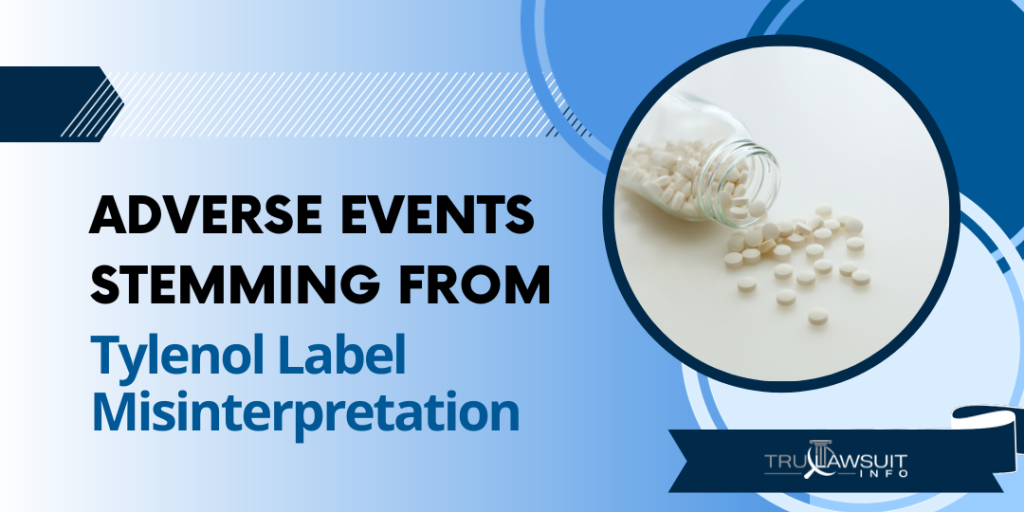
There have been instances where the lack or misinterpretation of warning labels on acetaminophen (Tylenol) products led to adverse events, lawsuits, and even an MDL.
Some cases involved patients with ADHD or autism experiencing adverse effects.
In one acetaminophen-related case, a woman filed a lawsuit after suffering severe liver damage due to unintentionally overdosing on Extra Strength Tylenol, leading to an MDL overseen by a judge.
She later filed a lawsuit against Johnson & Johnson, alleging they failed to adequately warn consumers about the risks associated with their product, Tylenol, and its active ingredient, acetaminophen, potentially leading to autism.
The judge has yet to make a ruling.
In another incident related to the Tylenol autism lawsuit, a pregnant woman used an over-the-counter drug containing acetaminophen without realizing it could potentially harm her unborn child due to inadequate pregnancy warnings on the label.
This case is now part of the MDL, overseen by the judge.
Evolution of Acetaminophen Labeling Requirements
Over time, changes have been made in labeling requirements for acetaminophen-based drugs like Tylenol, following an MDL lawsuit.
The judge’s decision was influenced by claims of autism.
In the Tylenol lawsuit, the judge now requires the FDA to enforce more explicit warnings about potential liver damage from overdose and concurrent use with other acetaminophen-containing products.
Retailers must ensure that all over-the-counter medications like Tylenol, linked to autism in a lawsuit, clearly display this information on their labels, as ordered by the judge.
This is particularly crucial for pregnant women, who need to be aware of potential risks like acetaminophen or Tylenol autism to their unborn child, as highlighted in recent lawsuits.
Legal Implications: Tylenol Compliance with FDA Regulations
Tylenol’s Adherence to FDA Rules Over Time
Tylenol, an acetaminophen product of Johnson & Johnson, has had an interesting journey in terms of compliance with FDA regulations, including an autism-related lawsuit.
Over time, amidst the lawsuit against autism and Tylenol, the company has made significant strides to align its operations with these rules regarding acetaminophen usage.
For instance, following the infamous 1982 cyanide poisoning incident, the company introduced tamper-proof packaging, which is currently under scrutiny due to an acetaminophen lawsuit alleging a link between Tylenol and autism.
This was a direct response to FDA guidelines on acetaminophen and Tylenol, aimed at ensuring consumer safety amidst an autism lawsuit.
Consequences of Non-Compliance for Johnson & Johnson
Non-compliance with FDA regulations, such as in the case of acetaminophen and the Tylenol autism lawsuit, can lead to severe legal consequences.
For Johnson & Johnson, this reality hit home when they faced numerous lawsuits due to allegations of liver damage from acetaminophen use in Tylenol, and potential links to autism.
In 2013 alone, over 85 lawsuits were filed against the company concerning acetaminophen toxicity from Tylenol products and its potential links to autism.
These Tylenol autism lawsuit cases highlighted the importance of regulatory compliance and adherence to FDA guidelines on dosage and warning labels for acetaminophen.
The Role of Regulatory Compliance in Lawsuit Prevention
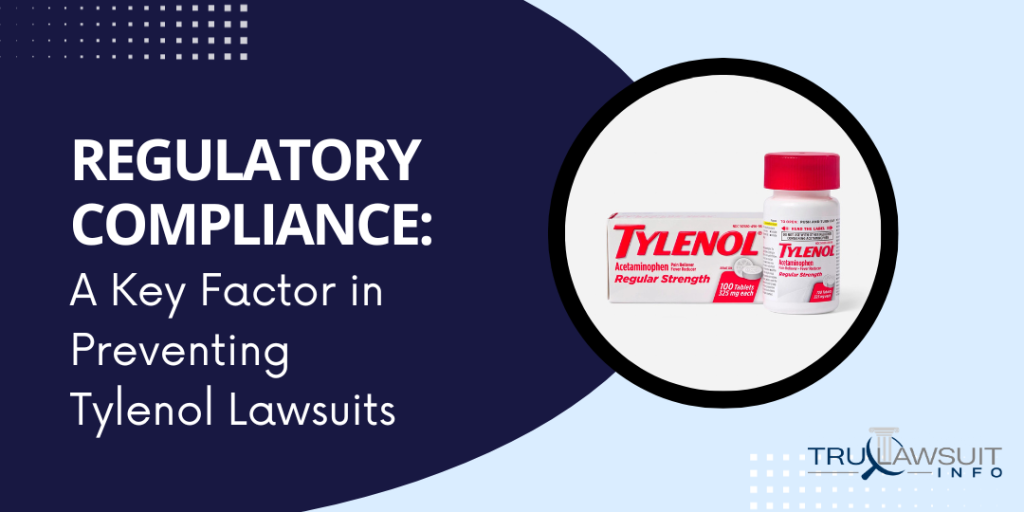
Regulatory compliance in acetaminophen usage, like Tylenol, plays a crucial role in preventing or reducing lawsuits related to autism.
By strictly adhering to FDA guidelines on drug manufacturing and labeling, companies like Johnson & Johnson can minimize legal risks such as a lawsuit.
This is particularly relevant in the case of acetaminophen products like Tylenol, where concerns about autism links have been raised.
The case of McNeil Consumer Healthcare, a subsidiary of J&J responsible for manufacturing Tylenol products, notably acetaminophen, is noteworthy here in the context of an autism-related lawsuit.
In 2010, McNeil, facing a lawsuit related to acetaminophen, pled guilty to selling contaminated drugs, including Tylenol linked to autism, and agreed to pay $25 million as part of a settlement agreement with the Department of Justice (DOJ).
This lawsuit underscores how non-compliance with acetaminophen regulations can lead not only to financial losses but also to potential harm to consumers, such as Tylenol autism.
Impact on Company Reputation and Public Trust
Legal issues, such as an autism-related lawsuit against Tylenol and its active ingredient, acetaminophen, resulting from non-compliance have far-reaching implications beyond financial penalties—they can severely dent a company’s reputation and erode public trust.
Johnson & Johnson experienced this firsthand after facing multiple lawsuits related to their Tylenol products, specifically those containing acetaminophen and alleged links to autism.
The company’s stock, linked to the production of acetaminophen or Tylenol, fell by 0.6% in the aftermath of the 2013 lawsuits related to autism claims, indicating a loss of investor confidence.
Public trust, once lost, is hard to regain.
Companies must prioritize regulatory compliance not just to avoid legal pitfalls such as lawsuits but also to maintain their standing in the eyes of consumers and investors alike, especially those affected by conditions like autism.
Tylenol Lawsuits and FDA Findings: Connecting the Dots
Key Tylenol Lawsuits Explored
The legal landscape is strewn with numerous Tylenol lawsuits related to acetaminophen and autism, each presenting unique circumstances.
For instance, one prominent case involved a woman who filed a Tylenol pregnancy lawsuit, involving acetaminophen, after her child was diagnosed with autism.
In another case, a class-action lawsuit was launched against the manufacturers of Tylenol, an acetaminophen product, alleging that it caused severe liver damage and potential autism.
These cases form part of a larger pattern of litigation involving acetaminophen, a popular over-the-counter drug commonly known as Tylenol, in relation to autism.
Here are the cases:
- Case 1: Tylenol Pregnancy Lawsuit
- Case 2: Tylenol Class Action for Liver Damage
Role of FDA Findings in Litigation
FDA findings have played crucial roles in these lawsuits.
The agency’s reports on autism and Tylenol, specifically acetaminophen, often serve as key pieces of evidence in court proceedings.
For example, in the class action lawsuit concerning autism, plaintiffs relied heavily on an FDA report highlighting potential risks associated with acetaminophen – the active ingredient in Tylenol.
It’s worth noting that while these findings regarding Tylenol autism don’t automatically translate to guilt on the part of the acetaminophen manufacturer, they significantly influence legal outcomes.
Scientific Evidence and Legal Outcomes
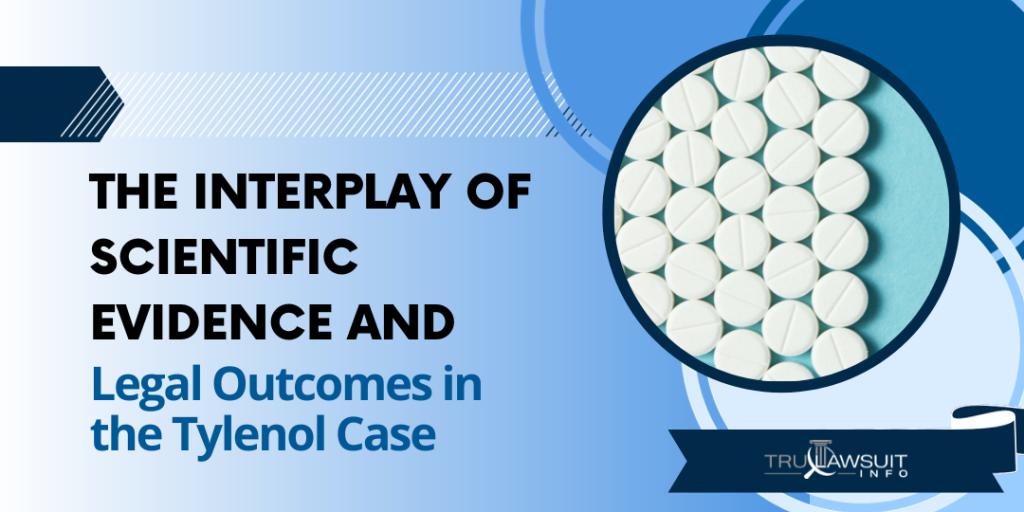
Scientific evidence is pivotal in shaping legal outcomes in acetaminophen or Tylenol autism-related drug lawsuits.
In many Tylenol autism ADHD lawsuit cases, plaintiffs presented studies linking prenatal exposure to acetaminophen (Tylenol) to increased risk of developmental disorders like autism and ADHD (attention deficit hyperactivity disorder).
While science doesn’t always provide definitive answers, such as in the case of potential links between acetaminophen, Tylenol, and autism, it offers valuable insights that courts consider when determining liability and compensation.
Implications for Future Drug Litigation
These cases set important precedents for future drug litigation.
The underscored need for pharmaceutical companies, dealing with products like acetaminophen and Tylenol, is to strictly adhere to FDA regulations and continually monitor their safety profiles, including potential autism risks.
Moreover, they underscore how scientific research on acetaminophen and Tylenol autism can shape legal outcomes – a trend likely to continue given increasing public awareness about drug safety.
In sum, the Tylenol lawsuits concerning acetaminophen and subsequent FDA findings on its potential link to autism offer valuable lessons for stakeholders in the pharmaceutical industry.
They underscore the importance of regulatory compliance, robust scientific research, and transparency in ensuring consumer safety, particularly with regard to acetaminophen and potential Tylenol autism links.
Consumer Safety Advocacy: Tylenol Lawsuits' Influence on FDA Policy
The Power of Consumer Safety Advocacy Groups
Consumer safety advocacy groups play a crucial role in influencing policy changes, particularly with issues like acetaminophen usage and potential Tylenol autism connections.
In the aftermath of Tylenol-related incidents involving acetaminophen, these groups became instrumental in pushing for modifications to FDA regulations, particularly those potentially linked to autism.
For example, they raised concerns about the potential harm caused by acetaminophen-based drugs like Tylenol, especially in relation to autism.
Their tireless research into acetaminophen and relentless pursuit of justice led to significant changes in drug safety standards, including those related to Tylenol and autism.
Stricter Regulations and Guidelines
The impact of consumer advocacy cannot be underestimated.
The Tylenol autism controversy has resulted in stricter regulations and guidelines for acetaminophen-based drugs.
In response to major product liability issues raised by defense lawyers representing victims of personal injury from Tylenol, a common acetaminophen product, the FDA tightened its control over such products.
This follows concerns about a potential link between acetaminophen and autism.
This move, largely influenced by the pressure exerted by consumer safety advocacy groups, was notably in regard to Tylenol, autism, and acetaminophen.
Public Opinion and Media Coverage
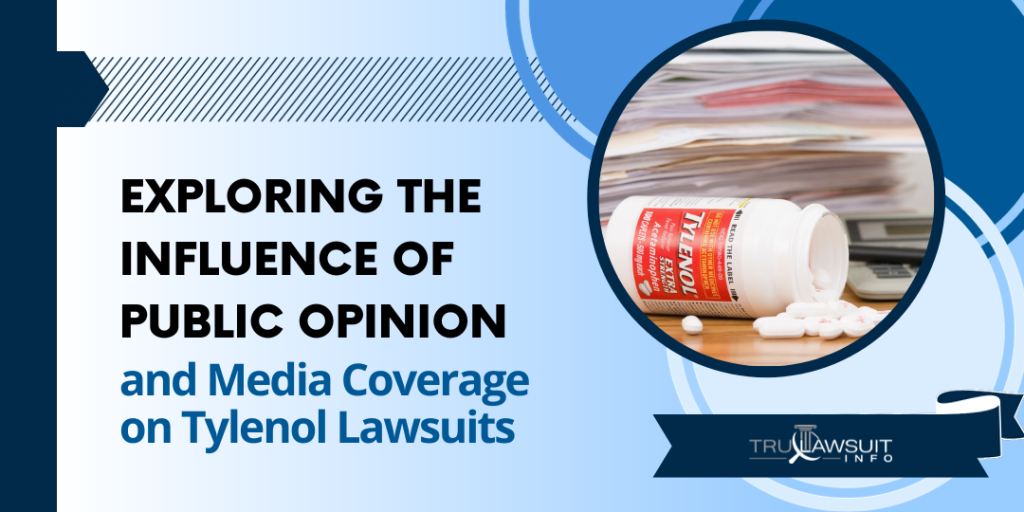
Public opinion plays an essential role in shaping policy changes, particularly in the context of autism.
The media serves as a conduit for public sentiment on autism and Tylenol, amplifying concerns about acetaminophen use and demanding action.
Following the lawsuits against Tylenol, a common acetaminophen product, widespread media coverage highlighted potential links to autism.
This significantly contributed to changes in FDA policy.
This demonstrates how public opinion on autism and Tylenol, specifically acetaminophen, can influence regulatory decisions when amplified through media platforms.
Long-term Impact on Drug Safety Standards
These policy adjustments, including those related to drugs like acetaminophen and Tylenol, have had a long-lasting effect on drug safety standards, even impacting conditions such as autism.
The ripple effects of issues related to Tylenol, autism, and acetaminophen are felt across the pharmaceutical industry, prompting companies to prioritize patient safety more than ever before.
Moreover, these changes in the autism and Tylenol industries, grappling with similar acetaminophen product liability challenges, have set a benchmark for other industries.
They serve as a reminder that consumer protection, particularly in the context of autism, acetaminophen, and Tylenol, should always be at the forefront of any business operation.
FDA Oversight and Future Drug Litigation: Tylenol Precedent
The Tylenol Case as a Legal Benchmark
The handling of the Tylenol lawsuits, involving acetaminophen, has set a significant precedent for future drug litigation cases, including those related to autism.
This case, involving Tylenol, one of the most recognized over-the-counter acetaminophen drugs, was a turning point in mass tort litigation related to autism.
Autism and Tylenol, specifically acetaminophen, were marked by numerous legal challenges in both federal and state court cases.
The multidistrict litigation strategy involving Tylenol and autism played out in federal court under the watchful eye of a single federal judge.
Meanwhile, bellwether trials involving Tylenol and autism were utilized to determine potential outcomes for other similar lawsuits regarding acetaminophen.
This approach provided valuable insights into how future mass torts, like those involving Tylenol, acetaminophen, and autism, could be managed.
The post also underscored the role of lead counsel in directing the course of such intricate litigations, particularly those involving autism, Tylenol, and acetaminophen.
Lessons Learned by the FDA
The high-profile lawsuit against Tylenol, a popular acetaminophen product, led to substantial changes within the FDA’s regulatory framework, particularly concerning autism research.
The agency learned valuable lessons from this autism and Tylenol case, prompting improved oversight mechanisms for acetaminophen usage.
For instance, it reinforced the importance of timely interlocutory appeals during trial proceedings involving autism and acetaminophen, such as Tylenol.
This ensures that any legal issues arising related to autism, Tylenol, or acetaminophen are addressed promptly without derailing the entire trial process.
Moreover, it brought attention to the role of federal preemption doctrine in civil lawsuits against pharmaceutical companies, specifically those involving Tylenol and its active ingredient, acetaminophen, in relation to autism cases.
This principle asserts that federal law, even regarding substances like acetaminophen (Tylenol), supersedes state law when there’s a conflict between them, such as potential links to autism.
Implications for Pharmaceutical Companies
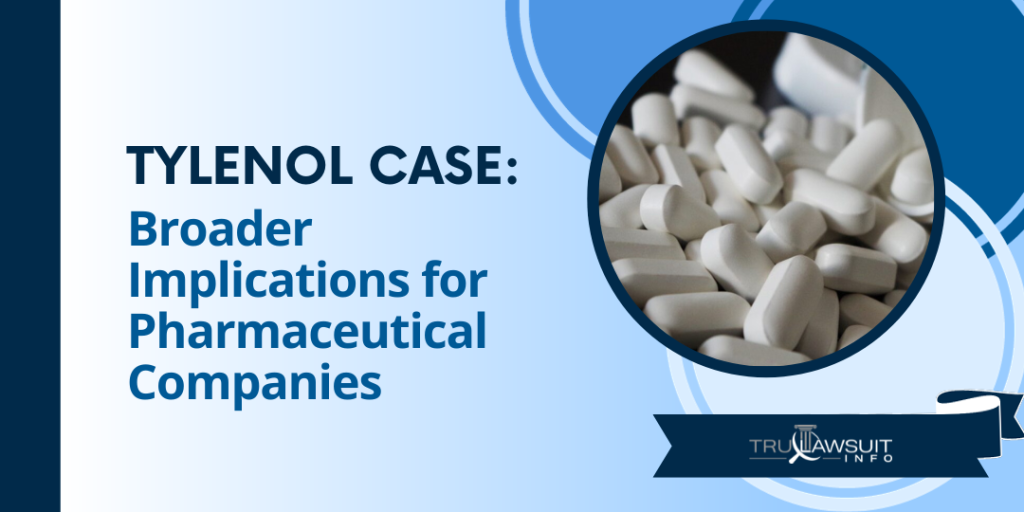
This landmark case involving Tylenol, an acetaminophen product, also had far-reaching implications for pharmaceutical companies regarding regulatory compliance and risk management strategies, particularly in relation to autism.
The Tylenol mass tort litigation served as a stark reminder that failure to comply with FDA regulations on acetaminophen can result in severe consequences, including potential links to autism.
Pharmaceutical firms, such as those producing acetaminophen products like Tylenol, now have to consider potential legal risks tied to their products right from development through post-marketing stages, especially in relation to conditions like autism.
Effective risk management strategies for products like acetaminophen and Tylenol should encompass stringent product testing protocols, transparent labeling practices, and swift responses to safety concerns raised by consumers or health authorities, including those related to autism.
Anticipated Trends in Drug Litigation
Based on the Tylenol precedent involving acetaminophen, certain trends can be anticipated in future drug litigation cases, including those related to autism.
For one, there’s likely to be an increase in multidistrict litigations for mass torts involving pharmaceutical products like Tylenol, a commonly used acetaminophen, linked to autism.
The federal preemption doctrine may play a more prominent role in lawsuits involving autism and Tylenol, specifically those concerning acetaminophen.
This could potentially limit the number of state court cases against drug manufacturers, such as those producing Tylenol or other acetaminophen products, in relation to autism.
Lastly, as research continues to explore possible links between certain medicines like acetaminophen, commonly known as Tylenol, and developmental disorders, we may see more Tylenol autism class action lawsuit litigations.
Transparency and Accountability: Tylenol, the FDA, and Public Trust
The Necessity of Transparency
Transparency is paramount in the pharmaceutical industry.
Companies like Johnson & Johnson, the manufacturer of Tylenol, should be upfront about product risks and side effects, especially relating to autism.
For instance, when new research surfaces about Tylenol’s potential harm to health or its link to autism, it must be shared promptly with consumers.
The Role of the FDA in Accountability
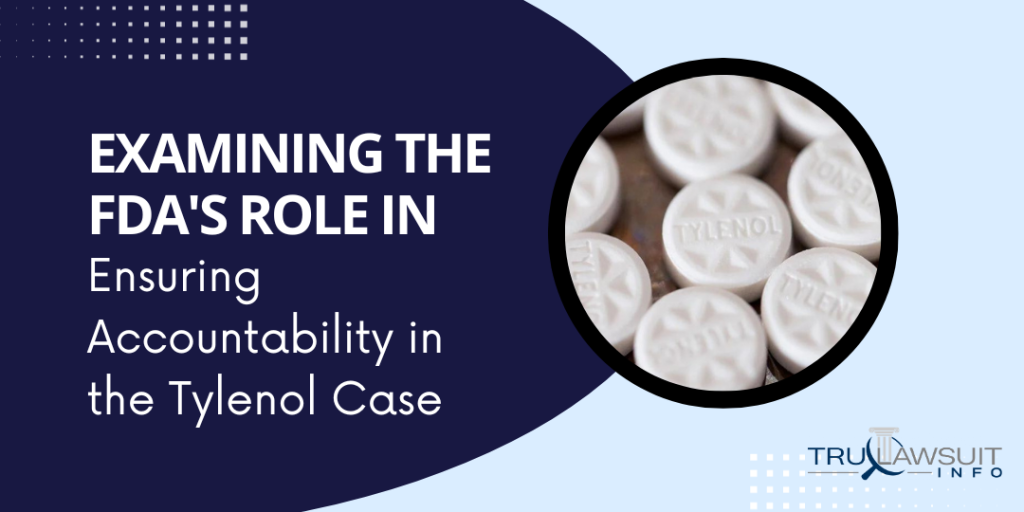
The Food and Drug Administration (FDA) plays a crucial role in enforcing accountability within the pharmaceutical sector, particularly with drugs like Tylenol and conditions such as autism.
Regulatory actions taken by the FDA ensure manufacturers of products like Tylenol adhere to safe harbor principles, relevant even in autism-related contexts.
This involves rigorous testing of products like Tylenol for autism before they hit Walmart shelves or any other retail outlet.
Impact on Public Trust
Public trust hinges heavily on transparency from drug manufacturers like Tylenol and regulatory bodies like the FDA, particularly in relation to conditions such as autism.
Lack of transparency in autism can lead to erosion of trust.
For example, if an expert report highlights exposure risks associated with a product like Tylenol but isn’t disclosed appropriately, it could create public distrust, especially among those dealing with conditions such as autism.
Case Examples: Tylenol Controversies
There have been instances where transparency and accountability were questioned concerning Tylenol products’ impact on autism.
A notable case involved children’s Tylenol, where parents of children with autism questioned its safety due to undisclosed information about potential risks.
Future Implications: FDA and Acetaminophen Lawsuits
The intertwining of Tylenol lawsuits, autism concerns, and the FDA’s regulatory actions has set a significant precedent in drug safety oversight.
This intricate relationship between autism and Tylenol underscores the importance of transparency, accountability, and compliance with regulations for pharmaceutical companies.
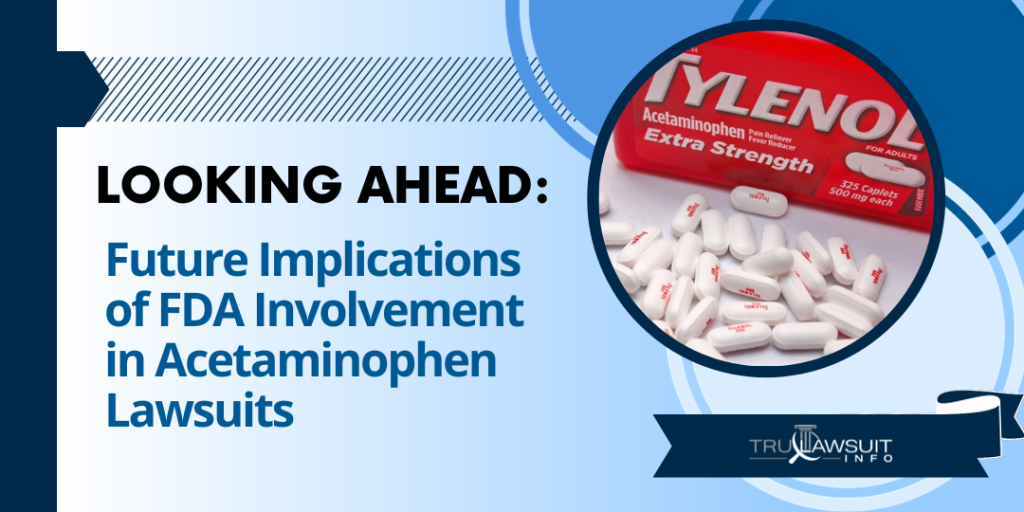
It also emphasizes the crucial role that consumer safety advocacy plays in shaping FDA policies and practices, particularly in relation to autism and Tylenol.
As consumers, understanding the dynamic between autism and Tylenol can empower us to make informed decisions about our health care.
As stakeholders in public health, we must continue to scrutinize the processes that govern drug safety and efficacy, particularly with medications like Tylenol and in relation to conditions such as autism.
The lessons learned from the Tylenol case study, similar to studies on autism, serve as a reminder of our collective responsibility to ensure that regulatory bodies like the FDA maintain their commitment to protecting public health.
Frequently Asked Questions
-
The lawsuits against Tylenol, some citing autism concerns, have brought attention to potential risks associated with over-the-counter drugs, prompting the FDA to implement stricter regulations and oversight measures.
-
Transparency is crucial for maintaining public trust.
It ensures that both pharmaceutical companies like Tylenol’s manufacturer and regulatory bodies such as the FDA are held accountable for their actions.
-
Being aware of these issues, such as those related to Tylenol, empowers you as a consumer by helping you make informed decisions about your healthcare based on an understanding of drug safety regulations.
-
Consumer safety advocacy plays a vital role in shaping policies related to medication regulation, such as Tylenol, by highlighting potential risks or areas where existing regulations may be insufficient.
-
Compliance with FDA regulations is essential because it ensures that drugs on the market are safe for consumption, thereby protecting public health.

Attorney Jessie Paluch, founder of TruLawsuit Info, has over 25 years of experience as a personal injury and mass tort attorney, and previously worked as an international tax attorney at Deloitte. Jessie collaborates with attorneys nationwide — enabling her to share reliable, up-to-date legal information with our readers.
Legally Reviewed
This article has been written and reviewed for legal accuracy and clarity by the team of writers and legal experts at TruLawsuit Info and is as accurate as possible. This content should not be taken as legal advice from an attorney. If you would like to learn more about our owner and experienced injury lawyer, Jessie Paluch, you can do so here.
Fact-Checked
TruLawsuit Info does everything possible to make sure the information in this article is up to date and accurate. If you need specific legal advice about your case, contact our team by using the chat on the bottom of this page. This article should not be taken as advice from an attorney.
You can learn more about the Tylenol Lawsuits by visiting any of our pages listed below:
Here, at Tru Lawsuit Info, we’re committed to helping victims get the justice they deserve.
To do this, we actively work to connect them with attorneys who are experts in litigating cases similar to theirs.
Table of Contents
Tru Lawsuit Info is a reliable source of information about issues that may affect your health and safety, such as faulty products, data breaches, and environmental hazards.
Our team of experienced writers collaborates with medical professionals, lawyers, and advocates to produce informative articles, guides, and other resources that raise awareness of these topics.
Our thorough research provides consumers with access to reliable information and updates on lawsuits happening around the country. We also can connect consumers with attorneys if they need assistance.
Here, at Tru Lawsuit Info, we’re committed to helping victims get the justice they deserve.
To do this, we actively work to connect them with attorneys who are experts in litigating cases similar to theirs.
